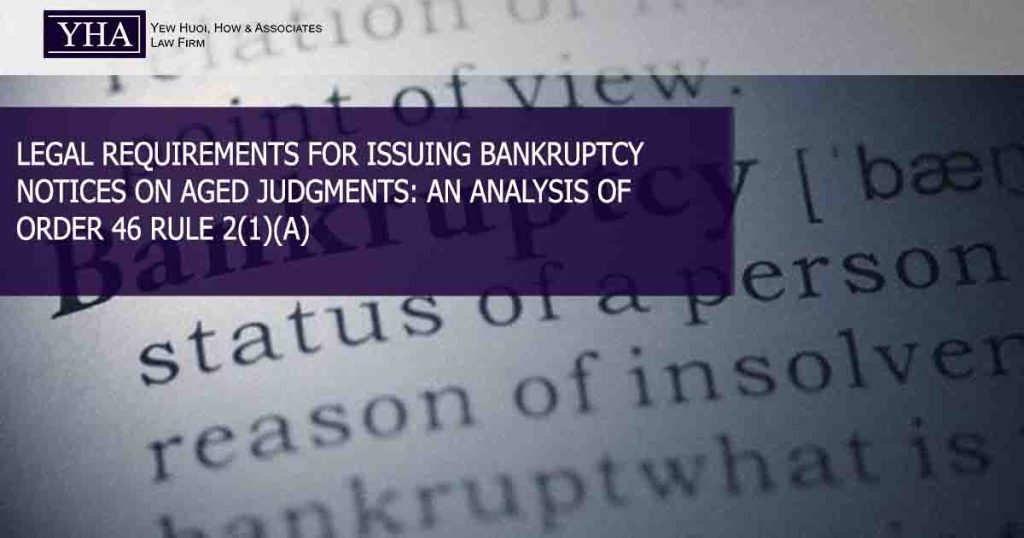ILLUSTRATIVE SCENARIO
A Judgment Creditor (JC) issued a bankruptcy notice (BN) on a judgment over six years old without first obtaining the required court leave under Order 46 rule 2(1)(a) of the Rules of Court 2012. This scenario raises pertinent questions about the adherence to established legal frameworks when initiating bankruptcy proceedings based on aged judgments.
KEY ISSUES
- Should the bankruptcy notice be set aside due to non-compliance with the requisite preconditions?
- Is it mandatory for a JC to be in a position to execute the judgment immediately before issuing a BN?
- Does the Federal Court’s decision in Ambank (M) Bhd v Tan Tem Son, which implies that leave of court under Order 46 rule 2(1)(a) is not necessary for issuing a BN on judgments older than six years, deviate from established legal principles?
- Should Order 46 rule 2 of the Rules of Court 2012 be overridden by interpreting bankruptcy proceedings merely as an ‘action upon a judgment’, governed only by section 6(3) of the Limitation Act 1953?
LAWS & LEGAL PRINCIPLES
- Section 3(1)(i) of the Bankruptcy Act 1967 outlines the conditions under which a creditor may petition for a debtor’s bankruptcy in Malaysia.
- Order 46 Rule 2(1)(a) of the Rules of Court 2012 provides that a writ of execution to enforce a judgment cannot be issued without court leave if six years have lapsed since the judgment date.
APPLICATION TO SCENARIO
- In this scenario, the court is likely to find that a JC who commenced bankruptcy proceedings after more than 6 years had elapsed from the date of the judgment must obtain prior leave of court pursuant to Order 46 rule 2 of the Rules of Court 2012.
- When the BN was issued, the respondent was not in a position to execute the judgment and therefore was not entitled to issue the BN.
- A bankruptcy proceeding was not execution, but a creditor’s right to issue bankruptcy was pegged to his right to proceed execution.
- A creditor was not entitled to issue bankruptcy if he was not in a position to issue execution on the judgment at the time the BN was issued.
- Ex parte Woodall was the first and foremost authority to be followed on the meaning of the words ‘execution thereon not having been stayed’ and the meaning of that phrase should be construed in section 3(1) of the Bankruptcy Act is not from the perspective of the Limitation Act 1953.
REFERENCE CASES
- Tan Chwee Hock v Ambank (M) Bhd [2012] 4 MLJ 159; [2012] MLJU 85; [2012] MLJU 418; [2012] MLJU 24
- Perwira Affin Bank Bhd v Lim Ah Hee [2004] 3 MLJ 253; [2004] 3 AMR 699; [2004] 2 CLJ 787
- Dr Shamsul Bahar Bin Abdul Kadir V Rhb Bank Bhd And Another Appeal [2015] 4 MLJ 1
- Re Lim Szu Ang; V Ex P Kewangan Utama Bhd [2005] 7 MLJ 487

